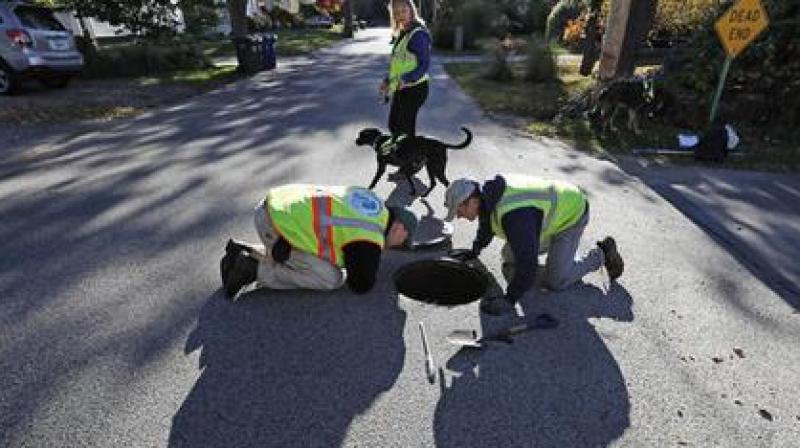Company trains dogs to sniff out fecal pollution

Fair Haven, N.J.: Some specially trained dogs are helping humans curb themselves.
A company that has trained dogs to recognize the smell of human fecal bacteria has been sniffing out sources of water pollution nationwide, discovering broken sewer pipes, leaking septic tanks and illegal sewage discharges, to the delight of environmental groups and government agencies.
Conventional water sampling tests take 24 hours at a laboratory, and often must be duplicated to ensure their accuracy. Testing of sewer systems with dye or smoke takes days and is costly. But the dogs give an instant yes-or-no indication as to whether a particular location is contaminated with the bacteria.
Using dogs rescued from shelters and specially trained to detect human waste in the same way other dogs are trained to sniff out drugs or explosives, the dogs of Otisfield, Maine-based Environmental Canine Services are always looking out for No. 2.
"I could make a lot of jokes about what kind of job this is, but I won't," said Scott Reynolds, who runs the company with his wife, Karen. "They alert us to the presence of human-specific bacteria, E. coli, poop, whatever you want to call it."
Human fecal contamination is a serious environmental problem that can cause illnesses including intestinal problems; hepatitis; respiratory infections; and ear, nose, and throat problems. Contamination from the E. coli bacterium, naturally occurring in human intestines, becomes dangerous if it is present in the environment in high enough concentrations. It is the leading cause of beach and waterway closures in the U.S., and tracking down the source of such pollution is a high priority for local and state governments.
One recent day, two of the company's dogs sniffed the edges of a pond near the New Jersey shore in Fair Haven, where polluted runoff was helping to choke the pond with thick algae that covered it with a green scum. Environmental groups including Clean Ocean Action, along with the local government, hired the company to determine whether any sewage was making its way into the pond, which feeds into the nearby Navesink River, a waterway having its own problems with bacterial contamination.
Sable, a 10-year-old German shepherd-husky mix Reynolds rescued from a shelter, and Remi, a 3-year-old black Lab mix they found as a stray, were put to work. They sniffed the shoreline and found nothing amiss.
"Just as important as what you find is what you don't find," Karen Reynolds said. The couple then took the dogs to a nearby manhole, which town workers had opened, to demonstrate what the dogs do when they smell human waste. Sable is trained to bark when he smells it; Remi is trained to sit still, and that's precisely what they did as soon as they sniffed the manhole.
Their rewards: a treat for Remi and some play time with a tennis ball for Sable. The dogs are trained to ignore fecal bacteria from animals, and customers often try to trick them (unsuccessfully) during evaluations of the company. Waterway contamination from bird, wild animal and pet waste is also a significant source of water pollution.
Rick Haley, a water quality analyst with the Skagit County, Washington, public works department, was among them. He had the dogs sniff samples of animal waste, all of which they ignored until they got to one containing human bacteria, which they flagged.
Once the dogs went to work there, they helped authorities find 15 to 20 leaking septic tanks that were polluting waterways, including one in Bayview State Park that routinely had to be closed to swimming when bacteria levels got high.
After the dogs found an upstream source of sewage from a faulty septic tank, repairs were made, and the beach saw much fewer closures, Haley said. The company has done work in 15 states, with bases in Otisfield; Lansing, Michigan; and Santa Rosa, California.
Peg Kohring, a director of The Conservation Fund in Sawyer, Michigan, has hired the dogs three times in the past five years to track down pollution making its way into Lake Michigan.
"We had quite a few beach closings because of high E. coli, and we did extensive water testing, but you don't know exactly where the problem is," she said. "With the dogs we're able to go right to the source. They found a homeowner whose house was only half connected to the septic system; the other half was washing directly out into a creek. We found 30 homeowners who had no idea where their sewage was going."
The dogs also helped the city of Bridgman, Michigan, pinpoint where a sewer pipe had broken.

